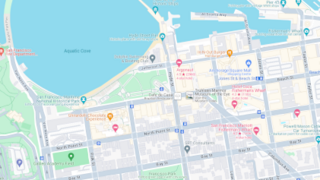
Google Maps is a web mapping platform and consumer application offered by Google. It offers satellite imagery, aerial photography, street maps, 360° interactive panoramic views of streets, real-time traffic conditions, and route planning for traveling by foot, car, bike, air and public transportation. As of 2020, Google Maps was being used by over one billion people every month around the world.

John Hanke is an American technology executive. Hanke led Google's Geo product division, which includes Google Earth, Google Maps, StreetView, SketchUp, and Panoramio. He is founder and CEO of Niantic, Inc., a software company spun out of Google and the creator of Pokémon Go.

Android is a mobile operating system based on a modified version of the Linux kernel and other open-source software, designed primarily for touchscreen mobile devices such as smartphones and tablets. Android is developed by a consortium of developers known as the Open Handset Alliance, though its most widely used version is primarily developed by Google. It was unveiled in November 2007, with the first commercial Android device, the HTC Dream, being launched in September 2008.
Waze Mobile Ltd, doing business as Waze, formerly FreeMap Israel, is a subsidiary company of Google that provides satellite navigation software on smartphones and other computers that support the Global Positioning System (GPS). In addition to turn-by-turn navigation, it incorporates user-submitted travel times and route details while downloading location-dependent information over a cellular network. Waze describes its application as a community-driven initiative that is free to download and use.

MIT App Inventor is a web application integrated development environment originally provided by Google, and now maintained by the Massachusetts Institute of Technology (MIT). It allows newcomers to computer programming to create application software (apps) for two operating systems (OS): Android and iOS, which, as of 20 January 2023, is in final beta testing. It is free and open-source software released under dual licensing: a Creative Commons Attribution ShareAlike 3.0 Unported license and an Apache License 2.0 for the source code.

Bump! was an iOS and Android mobile app that enabled smartphone users to transfer contact information, photos and files between devices. In 2011, it was #8 on Apple's list of all-time most popular free iPhone apps, and by February 2013 it had been downloaded 125 million times. Its developer, Bump Technologies, shut down the service and discontinued the app on January 31, 2014, after being acquired by Google for Google Photos and Android Camera.
GeoReader is a landmark locating software application and website for mobile iPhone and Android based devices. Users travel into the vicinity of a “talking point”, and the software enables the phone to read text aloud that is linked with a GPS location. In addition, users can create their own 200 character count text to add to the database, and choose to share these talking points publicly or privately. The system is hands free and requires no physical interaction. Once the app is installed in the mobile device, the user simply opens the app and starts their trip. The application automatically then starts to search for any GPS tagged talking points within range of the user.
Android Developer Lab is a series of mobile software development-focused events around the world held annually by Google. They include bootcamps and technical sessions focused on Android and give participants an excellent chance to learn about the state of the Android platform, get hands-on with the latest version of the SDK, test applications on the latest sample Android devices, get questions answered by Google engineers from the Android team as well as meet other like-minded members of the local Android developer community.

Google Play, also known as the Google Play Store and formerly Android Market, is a digital distribution service operated and developed by Google. It serves as the official app store for certified devices running on the Android operating system and its derivatives, as well as ChromeOS, allowing users to browse and download applications developed with the Android software development kit (SDK) and published through Google. Google Play has also served as a digital media store, offering games, music, books, movies, and television programs. Content that has been purchased on Google Play Movies & TV and Google Play Books can be accessed on a web browser and through the Android and iOS apps.

Google Glass, or simply Glass, is a brand of smart glasses developed and sold by Google. It was developed by X, with the mission of producing a ubiquitous computer. Google Glass displays information to the wearer using a head-up display. Wearers communicate with the Internet via natural language voice commands.

OsmAnd is a map and navigation app for Android and iOS. It uses the OpenStreetMap (OSM) map database for its primary displays, but is an independent app not endorsed by the OpenStreetMap Foundation. It is available in both free and paid versions; the latter unlocks the download limit for offline maps and provides access to Wikipedia points of interest (POIs) and their descriptions from within the app. Map data can be stored on the device for offline use. Using the device's GPS capabilities, OsmAnd offers routing, with visual and voice guidance, for car, bike, and pedestrian. All of the main functionalities work both online and offline.

Ingress is an augmented reality (AR) mobile game developed and published by Niantic for Android and iOS devices. The game first released on December 14, 2013, for Android devices and then for iOS devices on July 14, 2014. The game is free-to-play, uses a freemium business model, and supports in-app purchases for additional in-game items. The mobile app has been downloaded more than 20 million times worldwide as of November 2018.
Roadtrippers is a web based software application, mobile app, and content provider that helps travelers plan road trips. The software lets users discover independently owned points of interest in the United States and Canada. Once a trip is saved, it can be synced to the Roadtrippers iPhone app, for turn-by-turn navigation, and further local discovery while on the road.

Niantic, Inc. is an American software development company based in San Francisco. Niantic is best known for developing the augmented reality mobile games Ingress and Pokémon Go. The company was formed as Niantic Labs in 2010 as an internal startup within Google. The company became an independent entity in October 2015 when Google restructured under Alphabet Inc. Niantic has additional offices in Bellevue, Los Angeles, Sunnyvale, Seattle, Lawrence, Tokyo, London, Hamburg, and Zurich.

F-Droid is an app store and software repository for Android, serving a similar function to the Google Play store. The main repository, hosted by the project, contains only free and open source apps. Applications can be browsed, downloaded and installed from the F-Droid website or client app without the need to register for an account. "Anti-Features" such as advertising, user tracking, or dependence on non-free software are flagged in app descriptions.

Google Cardboard is a discontinued virtual reality (VR) platform developed by Google. Named for its fold-out cardboard viewer into which a smartphone is inserted, the platform was intended as a low-cost system to encourage interest and development in VR applications. Users can either build their own viewer from simple, low-cost components using specifications published by Google, or purchase a pre-manufactured one. To use the platform, users run Cardboard-compatible mobile apps on their phone, place it into the back of the viewer, and view content through the lenses.

Here WeGo is a web mapping and navigation service, operated by HERE Technologies and originally developed by Nokia. In 2013, HERE Technologies released HERE Maps for Windows Phone and the World Wide Web as a revamped version of Nokia Maps. HERE Technologies released the HERE Maps application to the Android platform on December 10, 2014, and later for iOS on March 11, 2015. The company changed the product name to HERE WeGo in July 2016. It is the default maps service provider for the Amazon Fire tablets and smartphones.

Pokémon Go is a 2016 augmented reality (AR) mobile game, part of the Pokémon franchise, developed and published by Niantic in collaboration with Nintendo and The Pokémon Company for iOS and Android devices. It uses mobile devices with GPS to locate, capture, train, and battle virtual creatures, called Pokémon, which appear as if they are in the player's real-world location. The game is free-to-play; it uses a freemium business model combined with local advertising and supports in-app purchases for additional in-game items. The game launched with around 150 species of Pokémon, which had increased to around 700 by 2021.
Since its release in 2016, multiple real-life events and gatherings based on the augmented reality (AR) mobile game Pokémon Go have been held by its developer Niantic Labs outside of unofficial player gatherings. Typically, the events involve increased in-game rewards for participating players and are often held in cooperation with local organizations or governments.














